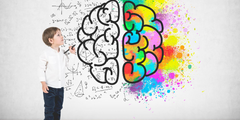Advances in technology provide the awareness that not only does the brain grow prenatally, but scientific brain development research informs us that a great amount of development happens in the pre-school years. It is both critical and exciting to realize that 90% of a child’s brain develops from conception to age five.

But, even more important and exhilarating for us, is to have the research demonstrate what best contributes to the healthiest development during this significant time. Additionally, studies reveal that early experiences have a long lasting impact throughout life.
This provides us with an extraordinary opportunity. It allows for us to positively contribute not just to the brain development but to the fullest potential of all children. It is my passion to share this information in very easy and practical ways.
We can make a real difference through creating awareness! Share with everyone you know who cares about children!
MAKING CONNECTIONS
A child is born with an estimated 86 billion neurons or brain cells. These neurons make connections with each other to make up the wiring of the brain. The brain physically grows as these connections are made. It is primarily ‘experience’ that influences the creation of these connections. Ninety percent of the brain develops by the age of five based on these experiences.
EARLY EXPERIENCES
The brain is “experience dependent”. It has to have experiences to develop. After eight months of experiences, an infant may already have 1,000 trillion connections created. Because the brain adapts to the environment it is exposed to, it will make connections based on either repeated negative experiences or repeated positive experiences.
CREATING ABILITIES
Brain Development happens through a "use it or lose it" process: connections that are frequently used are retained; other connections that are not repeatedly used will be pruned or eliminated so the active connections can become stronger. Abilities are developed through this process. Opportunities to move, play and explore with real objects is the way strong connections and abilities are developed best. DVD’s and flashcards are not ideal ways to develop healthy brains. Physical activity, time spent outdoors, good nutrition, plenty of sleep, safe environments, regular routines, and predictable loving relationships all contribute to optimal brain growth and early brain development.
LEARNING LANGUAGE
Early adult-child interactions have a dramatic impact on brain development. Researchers have shown that when parents spoke to their infants often, children learned almost 300 more words by age two than did children whose parents rarely spoke to them. Exposure to language through television does not provide these brain development benefits. Infants need to interact directly with others. Children need to hear people talk to them about what they are seeing and experiencing throughout the day for their brains to fully develop language skills.
LOVING INTERACTIONS
Warm, responsive care meets an infant's basic needs. However, consistent caregiving is not only comforting for an infant; it plays a critical role in nurturing healthy development. The way that parents and other caregivers respond to young children directly affects the base of later development. Loving, nurturing, consistent relationships have a positive impact on social-emotional development and learning throughout life.
Having Insights Makes a Wonderful Difference!
Ideas for making this all wonderful brain development happen for your child in everyday life really is easy!
Neuro-Nurturing Interaction Packets provide simple ideas that can be implemented immediately into everyday busy life for you to easily provide all that is needed with early brain development in mind. These are specifically designed with your busy day and caring heart in mind! There is one for each age from Birth - 5

To start to feel more confidence in your parenting and have more fun right away... Click here!
(Available In English or Spanish)






Be the first to comment